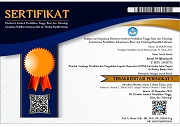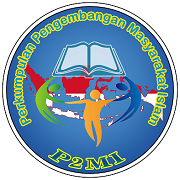POST-TRAUMATIC GROWTH AMONG TSUNAMI SURVIVORS: THE IMPACT OF PROBLEM-FOCUSED COPING ON LONG-TERM RECOVERY
Abstract
Keywords
Full Text:
PDFReferences
Alhuwailah, A., Khodabakhsh, M. R., & Khamis, F. (2021). Religion, coping, and mental health: A study among Muslim trauma survivors. Journal of Religion and Health, 60(1), 122–136. https://doi.org/10.1007/s10943-020-01120-w
Budianto, A. (2020). Religious coping and resilience among Muslim disaster survivors in Indonesia. Journal of Religion and Health, 59(3), 1451–1466. https://doi.org/10.1007/s10943-019-00880-3
Delcea, C., Rad, D., Toderici, O.F., & Bululoi, A.S. (2023). Post-traumatic Growth, Maladaptive Cognitive Schemas and Psychological Distress in Individuals Involved in Road Traffic Accidents—A Conservation of Resources Theory Perspective. Healthcare, 11.
Drapeau, C.W., Lockman, J.D., Moore, M., & Cerel, J. (2019). Predictors of Post-traumatic Growth in Adults Bereaved by Suicide. Crisis, 40 3, 196-202.
Echeburúa, E., & Amor, P.J. (2019). Memoria traumática: estrategias de afrontamiento adaptativas e inadaptativas. Terapia psicológica.
Eisenbeck, N., Carreno, D. F., & Pérez-Escobar, J. A. (2021). Meaning-centered coping in the COVID-19 pandemic: Direct and moderating effects on depression, anxiety, and stress. Journal of Happiness Studies, 22(1), 41–60. https://doi.org/10.1007/s10902-020-00218-3
Eissenstat, S.J., Kim, S., & Kim, B. (2022). A Meta-Study of Post-traumatic Growth and Coping Strategies. Psychological Reports, 127, 1588 - 1612.
Fino, E., Martino, G., & Lombardi, E. (2021). Predictors of posttraumatic growth in the aftermath of the COVID-19 pandemic: The role of resilience and meaning-focused coping. Journal of Loss and Trauma, 26(8), 722–732. https://doi.org/10.1080/15325024.2020.1867076
Hanprasertpong, J., Sookprasert, A., & Sirirat, S. (2023). Coping strategies and posttraumatic growth among Thai breast cancer survivors. Asian Pacific Journal of Cancer Prevention, 24(1), 177–183. https://doi.org/10.31557/APJCP.2023.24.1.177
Kalaitzaki, A. (2021). Posttraumatic growth in response to COVID-19 pandemic: The role of meaning in life, resilience and coping strategies. Psychological Trauma: Theory, Research, Practice, and Policy, 13(4), 448–455. https://doi.org/10.1037/tra0000946
Lazarus, R. S & Folkman, S. (1984). Stress, appraisal, and coping. New York: Springer
Li, Y., Zhang, X., & Wang, L. (2023). The influence of deliberate rumination on post-traumatic growth: The mediating role of psychological resilience. Frontiers in Public Health, 11, 1043402. https://doi.org/10.3389/fpubh.2023.1043402
Littleton, H., Axsom, D., & Grills-Taquechel, A. (2025). Post-traumatic growth, coping, and distress: A systematic review of the literature. Traumatology, 31(1), 1–14. https://doi.org/10.1080/15325024.2025.2487483
Meilianda, E., Safrida, S., & Direzkia, A. (2017). Recovery and reconstruction planning after the 2004 tsunami in Aceh, Indonesia. International Journal of Disaster Risk Reduction, 21, 312–319. https://doi.org/10.1016/j.ijdrr.2016.12.012
Olonilua, O., & Aliu, J. O. (2025). Reviewing the critical role of coping strategies in enhancing mental health and resilience in disaster survivors. Environmental Research: Health, 3(1), 025006. https://doi.org/10.1088/2673-4533/3/1/025006
Seaton, C. L., Oelke, N. D., & Berg, J. (2021). Decolonizing mental health services in disaster response: A scoping review. International Journal of Environmental Research and Public Health, 18(7), 3702. https://doi.org/10.3390/ijerph18073702
Shakespeare-Finch, J., Bowen, R., & Martin, S. (2022). A systematic review of longitudinal studies examining posttraumatic growth in adults. Trauma, Violence, & Abuse, 23(4), 1110–1124. https://doi.org/10.1177/1524838020976088
Smith, J., Walker, D., & Thompson, R. (2020). Coping strategies and post-trauma recovery in disaster-affected communities: A study of Banda Aceh. Journal of Trauma & Resilience, 34(2), 112-126.
Schneider, M., Hernandez, A., & Tan, P. (2020). Coping in the aftermath of natural disasters: The role of problem-focused coping. Psychological Science and Practice, 15(4), 87-100.
Tedeschi, R. G., & Calhoun, L. G. (1996). The post-traumatic growth inventory: Measuring the positive legacy of trauma. Journal of Traumatic Stress, 9(3), 455-471
Tedeschi, R. G., Park, C. L., & Calhoun, L. G. (1998). Post-traumatic growth: Positive change in the aftermath of crisis. Mahwah, NJ: Lawrence Erlbaum Associates.
Tedeschi, R. G., Shakespeare-Finch, J., Taku, K., & Calhoun, L. G. (2018). Posttraumatic growth: Theory, research, and applications. Routledge. https://doi.org/10.4324/9781315527433
Uğuz, Ö., & Cam, M.O. (2022). The Effect of Coping with Stress and Perceived Social Support on Post-traumatic Growth in Transplant Recipients. SSRN Electronic Journal.
Wilson, H. (2024). The role of psychological resilience in post-disaster recovery: A review of existing literature. SSRN. https://ssrn.com/abstract=5189285
Xie, C., & Kim, Y. (2022). Post-Traumatic Growth during COVID-19: The Role of Perceived Social Support, Personality, and Coping Strategies. Healthcare, 10.
Xiuji. (2017). Longitudinal Relationships between Social Support and Post-traumatic Growth among Adolescent Survivors of the Wenchuan Earthquake. Journal of Frontier in Psychology. 05. doi.org/10.3389/fpsyg.2017.01275
DOI: http://dx.doi.org/10.22373/al-ijtimaiyyah.v11i1.29509
Refbacks
- There are currently no refbacks.
Copyright (c) 2025 Siti Hajar Sri Hidayati, Muhana Sofiati Utami

This work is licensed under a Creative Commons Attribution-ShareAlike 4.0 International License.
Jurnal Al-Ijtimaiyyah has been indexed by:



















